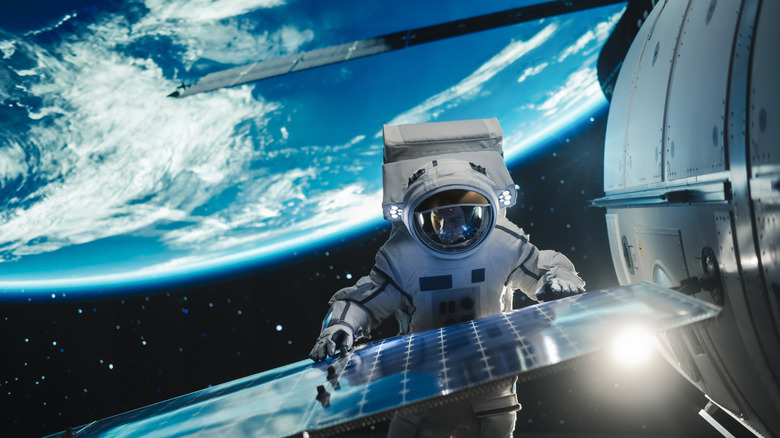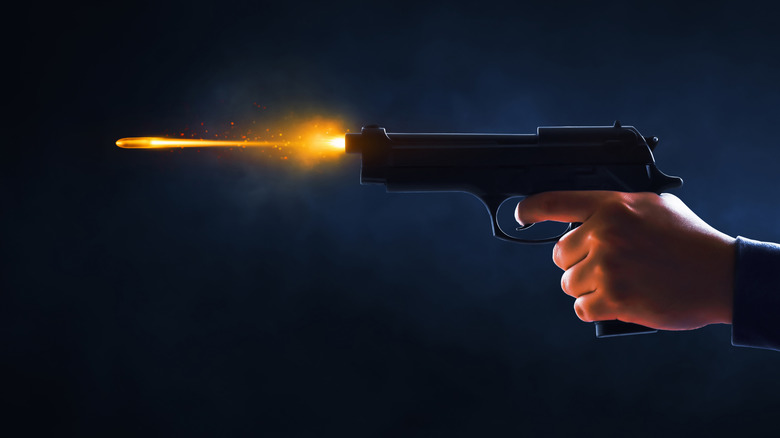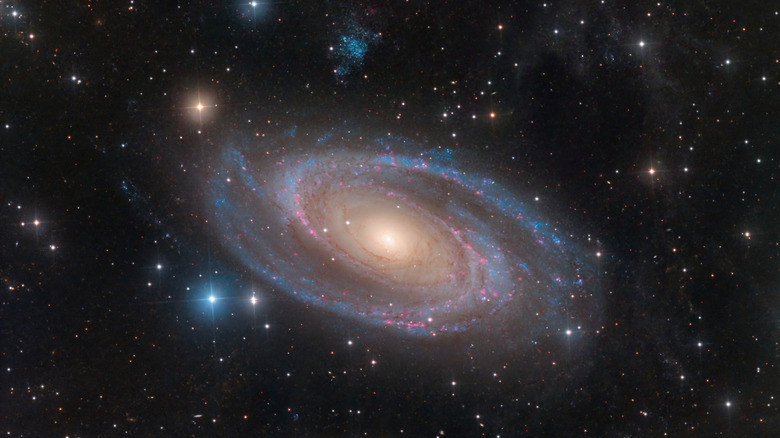Here's What Would Happen If You Fired A Gun In Space
On Earth, gunshots are influenced by familiar forces: gravity pulls the bullet down, air slows it due to friction, and the person shooting is held steady on the ground. Beyond the confines of our planet, however, these everyday conditions don't apply. Instead, there's the nothingness of space, no atmosphere, and no gravity for the most part. When firing a gun, recoil also becomes a serious problem to overcome as there's nothing to anchor you in place. You could technically propel yourself in a certain direction by firing a gun. That said, there's a lot more to it than that.
The drastic differences in conditions between Earth and space raise several questions. Would the gun even work in an environment without air? Would the gunpowder ignite without oxygen to fuel it? How would the bullet travel when there's no atmosphere? And what would happen to the shooter? The answers to these questions involve the laws of physics as well as fundamental science and engineering principles — from Newton's laws of motion to the design of modern ammunition.
Ballistics work differently in space
There's no need to go to space and fire a gun to see what would happen as physics already has all the answers. In fact, Russia even experimented with guns on spacecraft during the Cold War. We know the gun would work because modern cartridges are self-contained. That means that each cartridge contains a bullet, the primer, and the chemical propellant with its own oxidizer. This design ensures that the gun doesn't need atmospheric oxygen, and pulling the trigger in the space would still set off the chemical reaction and propel the bullet. However, once fired, the bullet's journey is very different in space than on Earth. Here, air resistance quickly slows the projectile, and Earth's gravity pulls it down. With no air drag in space, the bullet would continue indefinitely along its path, only altered if it passes near the gravitational pull of a planet or some other celestial object.
That said, the bullet wouldn't be the only thing in motion after firing a gun in space. The shooter would experience a much greater impact of the gun's recoil than on Earth. Newton's third law, which states that for every action there's an equal and opposite reaction, would apply to the shooter. Without the ground and air to resist against, the shooter would be pushed back and drift endlessly in the opposite direction of the shot.
It's unlikely for a bullet to hit something in space
Even though the bullet fired in space would keep traveling without slowing down, the chances that it would hit something (unless you shoot directly at the sun, moon, or an artificial satellite) are astronomically low. Space is so big that astronomers had to come up with a new unit to measure space distances — the astronomical unit — to measure the vast distance between celestial objects. A tiny projectile, such as a bullet, has almost no chance of colliding with planets, moons, or spacecraft. However, in low-Earth orbit, the bullet might eventually fall back towards the planet due to gravity. Once beyond Earth's orbit, the shot would simply continue along its lonely path.
The continuous expansion of the universe makes the scenario even more extreme. Galaxies are steadily moving away from each other as space itself stretches. Over vast timescales, this expansion means that distant objects may appear to drift away faster than light, let alone a tiny bullet. In other words, if you were to fire a gun into the depths of intergalactic space, your bullet wouldn't just miss its target, but the target may also move away from it. So, while the bullet would theoretically travel forever, the odds of it hitting anything meaningful are close to zero. It would become yet another fragment of matter drifting through space endlessly.


